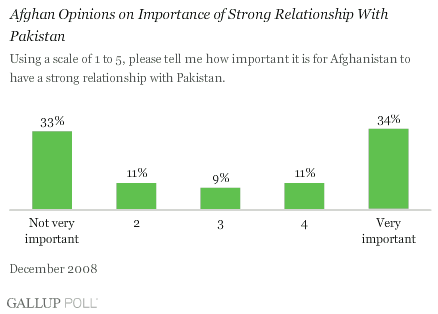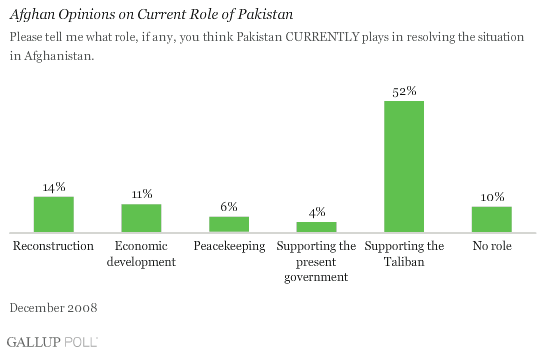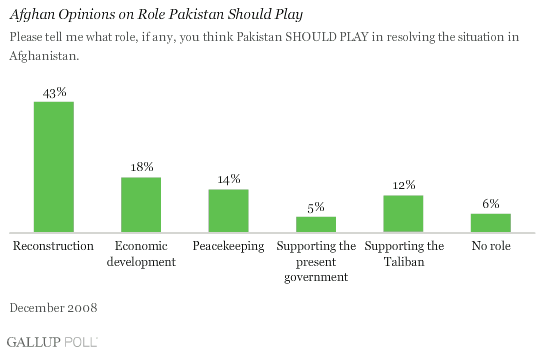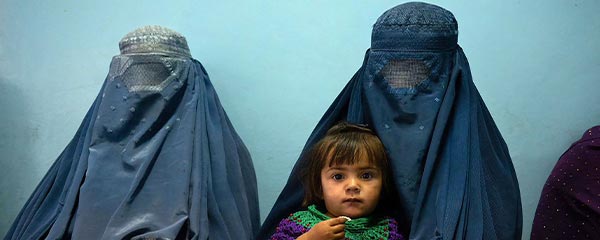WASHINGTON, D.C. -- Prior to Pakistan's recent military offensive against the Taliban, ���۴�ýfound Afghan opinions mixed regarding the importance of having a strong relationship with Pakistan. Thirty-three percent of respondents say a strong relationship with Pakistan is not very important, while 34% say it is.

In recent days, Pakistani forces have escalated their efforts to uproot the Taliban from the North West Frontier Province along the Afghanistan-Pakistan border. Pakistan and Afghanistan have pledged to help each other secure their shared mountainous border. However, Afghanistan has unique social ties with Pakistan beyond common security concerns. More than a million Afghan refugees fled to Pakistan during periods of Soviet and Taliban rule. And while Pakistan was once one of three countries to recognize the Taliban regime in Afghanistan, today the Pakistani government pledges support to the existing Afghan government.
In December 2008, ���۴�ýasked Afghans to assess Pakistan's current role in resolving the situation in their country. A slim majority of respondents (52%) perceived Pakistan to be supporting the Taliban leadership. Considerably smaller percentages saw Pakistan playing a role in reconstruction (14%), economic development (11%), and peacekeeping (6%). Ten percent saw Pakistan playing no role at all.

During a recent visit to the United States, Afghan President Hamid Karzai blamed Taliban safe havens, or "sanctuaries," in Pakistan for the worsening insurgency. The Pakistani government, previously reluctant to consistently engage militants in the country's semi-autonomous border region, now fears an expanding Taliban influence in Pakistan itself.
���۴�ýalso asked Afghans what role Pakistan should play in resolving the situation in their country. Here Afghans clearly want Pakistan to play a constructive role. Forty-three percent of respondents say Pakistan should play a role in reconstruction, while another 18% say economic development and 14% say peacekeeping -- in each case more than they currently perceive. Just 12% say Pakistan should support the Taliban leadership.

While the Pakistani government claims that 700 Taliban militants have been killed, it is too soon to assess the overall security impact the current Pakistani offensive will have. Already, the current offensive has displaced nearly more than half a million civilians, though it is unlikely many will seek refuge in Afghanistan, where per capita GDP is less than one-third that of Pakistan. The Pakistani government has made steps to improve economic conditions in Afghanistan, including negotiations to increase bilateral trade and providing reconstruction assistance, reported to be approximately $100 million. But before economic progress can get a foothold, security must improve in the rocky terrain between the two nations.
���۴�ýwill present more findings from Afghanistan in a at its world headquarters in Washington, D.C., Tuesday, May 19, 2009.
Survey Methods
Results are based on face-to-face interviews with 1,010 adults, aged 15 and older, conducted in December 2008 in Afghanistan. For results based on the total sample of national adults, one can say with 95% confidence that the maximum margin of sampling error is ±3.7 percentage points. In addition to sampling error, question wording and practical difficulties in conducting surveys can introduce error or bias into the findings of public opinion polls.
